A near-capacity crowd turned out late Sunday afternoon at the Oak Bluffs Tabernacle to cheer an unprecedented event on the Vineyard - the first Freedom Fund rally to support equal rights for Negroes throughout the country. The sponsor of the affair was the Cape Cod branch of the National Association for the Advancement of Colored People.
The site was highly appropriate, for Oak Bluffs and, more specifically, the Martha’s Vineyard Camp Meeting Association which operates the historic Tabernacle, have long epitomized the goals of equality that the NAACP actively promotes.
Because of balmy weather, the crowd gathered slowly, but it had swelled to many hundreds from the entire Island when the main address began. The speaker was Roy Wilkins, famed leader of the civil rights movement.
Sounds Theme of Meeting
Mr. Wilkins, executive secretary of the NAACP, sounded the meeting’s theme: “It is perfectly fitting for New England to be the mother of our movement, because our ideals and the ideals, traditions and history of New England are one in the same.”
He bitterly recounted continuing Negro deprivations, not only in the South but in the supposedly enlightened North. In a small town in Maine where lonely Negroes in the Air Force found “only snow, pine trees and white people,” local toughs scuffled with them at a social get-together - “and the Negroes were thrown out in the snow and pine trees.”
It was the Lewiston, Me., chapter of the NAACP, said Mr. Wilkins, which came to their aid and fought to integrate them with the pines, the snow and, above all, the white people.
So also has the NAACP been fighting in rural North Dakota, in Cairo, Ill., and of course in places like Albany, Ga.
“Wherever colored people have a problem,” Mr. Wilkins emphasized, “you have the NAACP giving help. The fact that they need help anywhere means you need an NAACP on Cape Cod to lend them your support.”
The rally was opened by the Rev. Marguerite A. Hill, assistant pastor of the Oak Bluffs Methodist Church, who delivered the invocation. “May what we do and what we say,” she prayed, “bring glory to Thee.”
The chairman of the meeting was Kivie Kaplan, Boston industrialist and long-time summer resident. He is a founder of the Cape Cod chapter of the NAACP and a member of the organization’s national board.
“Civil Rights Not Always Easy”
“Civil rights,” admitted Mr. Kaplan, “is not always an easy job. There are always problems, and we have one today - no public address system.”
Nevertheless, the speakers were so robust that they easily surmounted the problem. Among them were Walter A. Stevenson, president of the Cape Cod chapter. “Why should there be a Cape Cod chapter of the NAACP?” he asked, rhetorically. “Because Cape Cod is part of our country.”
Greetings from Governor Volpe were brought by his Air Force aide, Major George A. Johnson, who wore full Air Force regalia and expressed customary regrets for his chief’s unavoidable absence which the governor deeply regretted.
The Rev. Henry L. Bird, rector of the Episcopal Parish on Martha’s Vineyard, coupled his greetings with an endorsement of racial intermarriage which elicited surprised applause.
Then Mrs. Charlotte Hollaman, a concert singer, delivered two effective numbers - You’ll Never Walk Alone, from Carousel, and the spiritual, You Can Tell the World.
One of the most heartfelt ovations went to Prof. S. Ralph Harlow, another Oak Bluffs resident of many summers and a member of the NAACP’s national board.
“As a citizen of Oak Bluffs,” said Dr. Harlow, who recently turned 77, “I take pride that there are few places in the United States where the principles of the NAACP are practiced so widely as on our Island - in our schools, on our beaches, in our fellowship and in our worship.”
Segregation and Bigotry
Equally well known here was Rabbi Balfour Brickner, NAACP leader and for years a Vineyard visitor. “Segregation and bigotry,” he said, “though far from dead, have lost about all their real vigor and vitality. Their champions fight an unholy and losing war, as in Albany, Ga. Twenty years from now, we’ll be telling our children and grandchildren how this organization and the Negro people literally changed the structure and fabric of America.”
Distinguished guests introduced from the platform included Roger N. Baldwin, Rabbi Samuel Perlman, Rev. Francis Bowes Sayre, and Al Brickman.
In his soft-spoken but stirring speech, Mr. Wilkins said the NAACP has 1450 chapters in forty-eight states, from Hawaii to Maine. Even he admitted surprise that there are three chapters in chilly Alaska.
He poked fun at white editorial writers who demand responsibility and restraint of Negro leaders in the South, despite intolerable inequities.
Said Mr. Wilkins: “How much do you expect from a system that takes a man and crushes him before he’s out of short pants? This system tells him he can only hold certain jobs, only live in a certain part of the city, only go so far in life. Can this man have pride in a community that denies him his basic rights?”
Mr. Wilkins cited one Southern state where pupils at white vocational schools are taught electronics, while at colored schools the students learn tin-smithing. “And tin-smithing,” he said, “is about to go out the window. This is the era when man is going to the moon, yet our colored youngsters are being turned into tin-smiths.
Fight Came Late
“The trouble,” he went on, “is not that we are moving too fast. It is, rather, that the fight came so late. We have been in this country for 350 years. The first Negroes landed here in 1619, so I tell my white friends that if they did beat us to America, it was only by twelve years. Lots of white people I know where Johnny-come-latelys compared to colored people.”
Mr. Wilkins exhorted Vineyard support for his cause. “There’s not much poverty among the colored people on this Island,” he pointed out. “Why, when I arrived, people told me to look at the yachts in Oak Bluffs harbor that wealthy Negroes owned. I didn’t see many, but I was told they were all out at sea today.
“But you are the exception. In this country, colored people as a whole are poor. Their median income in 1960 was $3360, as against $6100 for whites.”
“One hundred and eighty-five years ago,” said Mr. Wilkins, “Thomas Jefferson, Patrick Henry and John Adams promised liberty or death, freedom from tyranny, freedom of speech, government by consent of the governed. All that Negroes want is to enjoy these rights - not tomorrow, or on some future date, but now.”
In his view, the Kennedy administration is solidly behind these goals, yet its policies are confused. “They are learning what we could - and did - tell them: you can’t buy the Southerners, you have to fight them. The same Senators who defeated medical care are lined up also against civil rights.
“To help gain these rights,” he concluded, “this Freedom Rally is being held. Our promise is to raise money but, even more, this is a rally within your own hearts. Today you have an opportunity to volunteer for true freedom.”
The audience rose and cheered him, then volunteers solicited contributions. Last year, according to Chairman Kaplan, the NAACP ran a deficit of $161,000.
The benediction was boomingly delivered by Rev. William B. Roane, pastor of Bradley Memorial Baptist Church in Oak Bluffs.
Then the crowd lazily dispersed into the soft, untroubled evening. In more ways than one, it was among the most mixed throngs in Vineyard history. As many whites as Negroes attended. Old people had come and so had toddlers. Widely varied outfits ranged from shorts and sandals to business suits and imported pumps - a true democracy of holiday habiliment.
The most orthodox ensembles were worn by the Oak Bluffs police. Halfway through the meeting, several officers were seen ambling around the Camp Meeting grounds. That would have been a sure sign of trouble down South where policemen are likely to harass such a gathering. But at the Vineyard’s Freedom Rally, the officers paused at the edges of the Tabernacle to hear the speeches, and afterwards they were models of courtesy in directing traffic to the nearest exits.

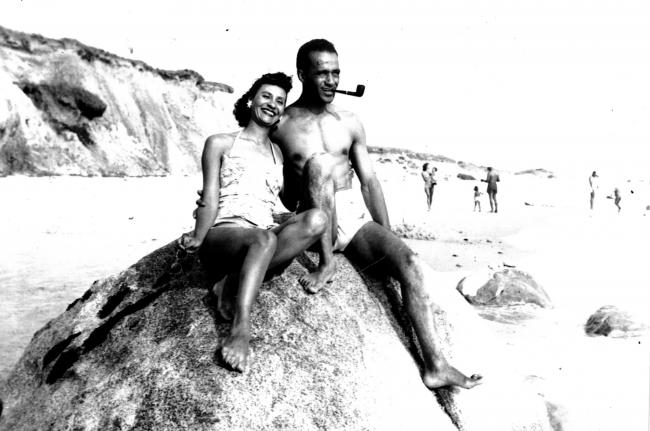
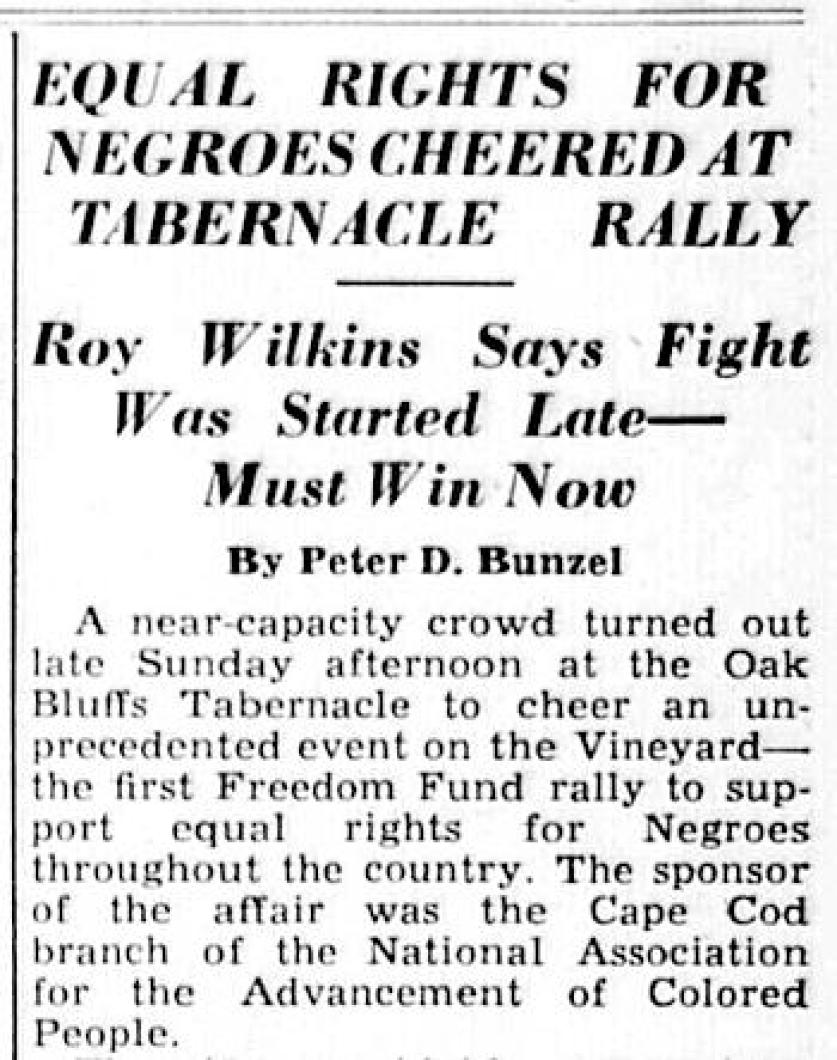



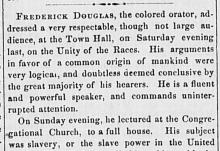
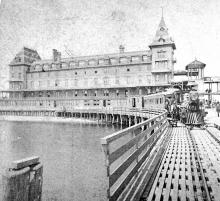
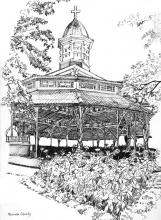
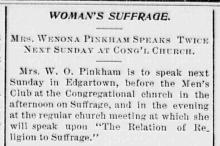

Comments